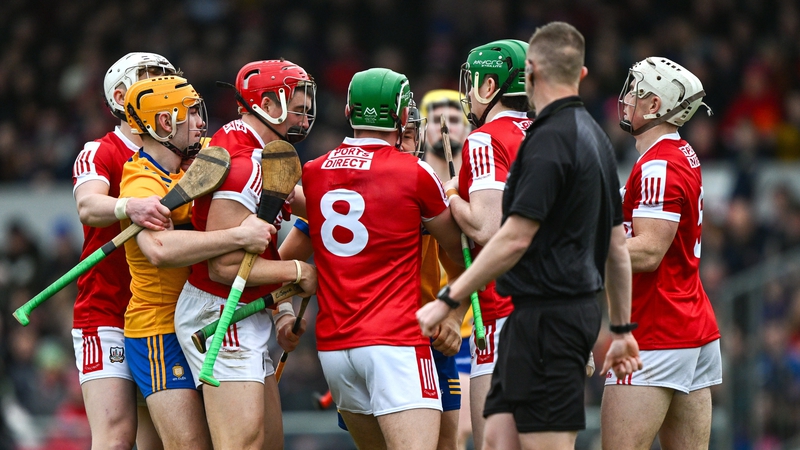Analysis: 3 research findings suggest referees might display a compensating tendency when it comes to awarding frees in matches
80 years ago, there was one scientist that was allowed to come and go as he pleased from the Manhattan Project in Los Alamos. John von Neumann's sizable contribution to the development of the nuclear bomb is widely documented, but you would not know it from watching Oppenheimer. The movie opens and closes with Oppenheimer meeting Albert Einstein at the Institute for Advanced Studies (IAS). The IAS was Von Neumann’s base for 25 years from 1933. While based at the IAS von Neumann co-authored The Theory of Games and Economic Behavior with Oskar Morgenstern. The book was to have a profound impact on the discipline of economics.
Von Neumann loved playing games and his late nights in Los Alamos were filled with poker games and scientific discussions. More importantly, he loved thinking about how games should be played. Poker examples litter The Theory of Games and Economic Behavior.
We need your consent to load this YouTube contentWe use YouTube to manage extra content that can set cookies on your device and collect data about your activity. Please review their details and accept them to load the content.Manage Preferences
From Mathematical Association of America Committee on Educational Media, 1966 documentary on mathematician John Von Neumann
The 1944 book leverages a crucial mathematical solution that von Neumann published in a 1928 paper called "On the Theory of Parlour Games". To arrive at a solution, von Neumann had to describe the abilities of the competitors. He decided to populate his mathematical model with competitors who always play their best possible strategies.
In the decades that followed, economists followed von Neumann’s lead. They populated their models with decision makers that make the best possible decisions. Recent evidence-based research on how people play games suggests that this is not always the case.
Using evidence from TV game shows, online games and sporting contests, researchers are examining the pattern in the decisions made by people in different settings. Nobel Laureate Richard Thaler has used decisions made on the TV shows Deal or No Deal and Golden Balls to suggest that people don’t behave like the decision makers presented in traditional economic models.
We need your consent to load this rte-player contentWe use rte-player to manage extra content that can set cookies on your device and collect data about your activity. Please review their details and accept them to load the content.Manage Preferences
From RTÉ Radio 1's Drivetime in 2017, Philip Boucher-Hayes reports on the work of behavioural economist and Nobel Prize winner Richard Thaler
Tobias Moskowitz has examined millions of decisions by baseball umpires to show that there is a bias in their decision making. The bias favours the player behind in the count. If the pitcher is behind, then they get the borderline calls. If the batter is behind, then they get the borderline calls.
The evidence suggests something similar happens in hurling and camogie. Last week the Journal of Sports Economics published a study by myself and co-authors from UCC and Croke Park. The research examines disciplinary sanctions in hurling, i.e. the number of free shots, yellow cards and red cards in the All-Ireland senior hurling championship for the years 2016-8.
There are three findings that suggest that hurling referees might display a compensating tendency when it comes to the awarding of free shots. First, the team behind on the scoreboard is statistically more likely to get the next free shot. Second, the further a team is behind on the scoreboard, the more likely they are to be awarded the next free shot. Third, the team that has been awarded less free shots is statistically more likely to be awarded the next free shot.
We need your consent to load this rte-player contentWe use rte-player to manage extra content that can set cookies on your device and collect data about your activity. Please review their details and accept them to load the content.Manage Preferences
From RTÉ Radio 1's Drivetime, Dr John Considine on his study which indicates hurling teams are more likely to be awarded frees if they are behind on the scoreboard
It is the combination of all three findings that makes us believe that there may be some sort of compensating tendency at play in the decision making of the referees. It is difficult to explain the combination of findings by reference to player behaviour alone. There is a case to be made that players might foul more when their team is ahead because of a fear of losing the lead. But this runs counter to the second finding. Fear is less of a factor when a team leads by seven point or more. Yet, the evidence shows that players foul more when they are further ahead.
It is important to be clear on the findings. Referees do not favour a particular team such as Kilkenny or Tipperary. Regardless of the team, it is more likely to be awarded a free when it is behind rather than when they are in front. In addition, our research shows that hurling referees do not favour home teams - nor do hurling referees have a bias toward favourites. This is reassuring for those involved in the game.
Our research shows that hurling referees do not favour home teams - nor do hurling referees have a bias toward favourites
The research was presented at two European conferences last autumn. One member of the audience was an inter-county camogie manager. They wondered if something similar happened in camogie. Around the same time, I met Eimear Ryan, All-Ireland senior camogie medal winner with Tipperary and author of the award-winning book The Grass Ceiling. We discussed our findings and a passage from her book where she describes the decisions of the referee in a county final.
This feedback prompted us to contact former Cork camogie analyst Niall Collins. He came onboard and we have now examined over three thousand decisions made by referees in camogie. The results support our findings for hurling and will be presented at the Irish Economic Association annual conference this week.
We need your consent to load this YouTube contentWe use YouTube to manage extra content that can set cookies on your device and collect data about your activity. Please review their details and accept them to load the content.Manage Preferences
Aaron Gillane and Cathal Barrett incident in 2021 Munster hurling final with commentary from Marty Morrissey and Michael Duignan
In the 2021 Munster hurling final, Aaron Gillane struck Cathal Barrett with the hurley. Limerick were ten points behind at the time. Commentator Marty Morrissey and analyst Michael Duignan supplied the words to accompany the pictures on the RTÉ broadcast. Duignan was adamant that Gillane should have got a red card. Almost nobody disagrees. Yet he received a yellow card.
We need your consent to load this YouTube contentWe use YouTube to manage extra content that can set cookies on your device and collect data about your activity. Please review their details and accept them to load the content.Manage Preferences
Michael Duignan and Daivd Forde in 1998 Offaly vs Clare All-Ireland semi-final
Back in 1998, the analyst was in Gillane’s position in the infamous Offaly-Clare game when Duignan struck David Forde with the hurley but was not sent off. Later, the referee that day said in Jimmy Sullivan's book Men In Black that "my first instinct when I saw it was, 'send him off’ but, as I came over to him – and this is the truth – I looked at the score and said 'oh God, there are nine points between them'." The statistics suggests that the honourable Jimmy Cooney is not alone.
The author has published on sport in a variety of peer-reviewed journals. He won an All-Ireland senior hurling medal in 1990 and has managed the Cork senior hurling and senior camogie teams.
Follow RTÉ Brainstorm on WhatsApp and Instagram for more stories and updates
The views expressed here are those of the author and do not represent or reflect the views of RTÉ


